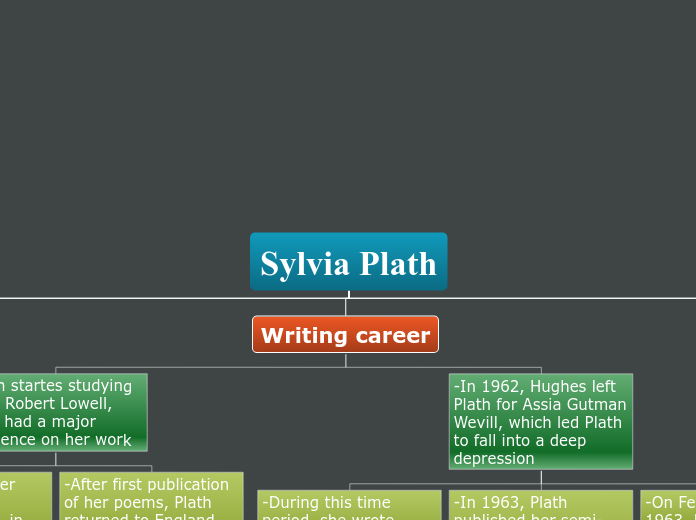Sylvia Plath
Herself
Born
October 27, 1932 in Boston, Massachusetts
Parents
Otto Plath
In 1940, when Sylvia was 8 years old, her father died from complications with diabetes
Aurelia Schober Plath
Education
-Started to keep a journal at age 11
-Her first national publication was in The Christian Science Monitor in 1950, right after she graduated high school
-She entered in Smith College in Northhampton, MA and became exceptional student
-In 1953, Plath's short story "Sunday at the Mintons" won first prize in a contest for Mademoiselle magazine
Allowed her to become a guest editor for the summer of 1953 in New York City
Writing career
Plath startes studying with Robert Lowell, who had a major influence on her work
-She published her first collection of poems, Colossus, in 1960 in England and two years later in the US
-After first publication of her poems, Plath returned to England and gave birth to her two children, Frieda and Nicholas
-In 1962, Hughes left Plath for Assia Gutman Wevill, which led Plath to fall into a deep depression
-During this time period, she wrote many of the poems that comprise Ariel
-In 1963, Plath published her semi-autobiographical novel The Bell Jar under the pseudonym "Victoria Lucas"
-On February 11, 1963, Plath committed suicide at age 31
Writing style
-Plath's later poems fall into a less rigid standard and are composed of a rhythm and meter that us more of an "ear-count"
-These poems sound like they are in Plath's own voice and therefore take on a sense of informality and urgency in their tone
-Her work is seen as extremely lyrical and symbolic, often times taking on themes of feminist criticism
Legacy
-After Plath's death, Hughes proceeded to publish Ariel as well as three other volumes of her work including The Collected Poems, which she won a Pulitzer Prize for in 1982, making her the first poet to won a Pulitzer prize after death
-Plath was seen as a very important poet during her lifetime, but has grown to become one of the most powerful American poets of the postwar period after her death
-She has inspired a generation of women within the feminist movement
